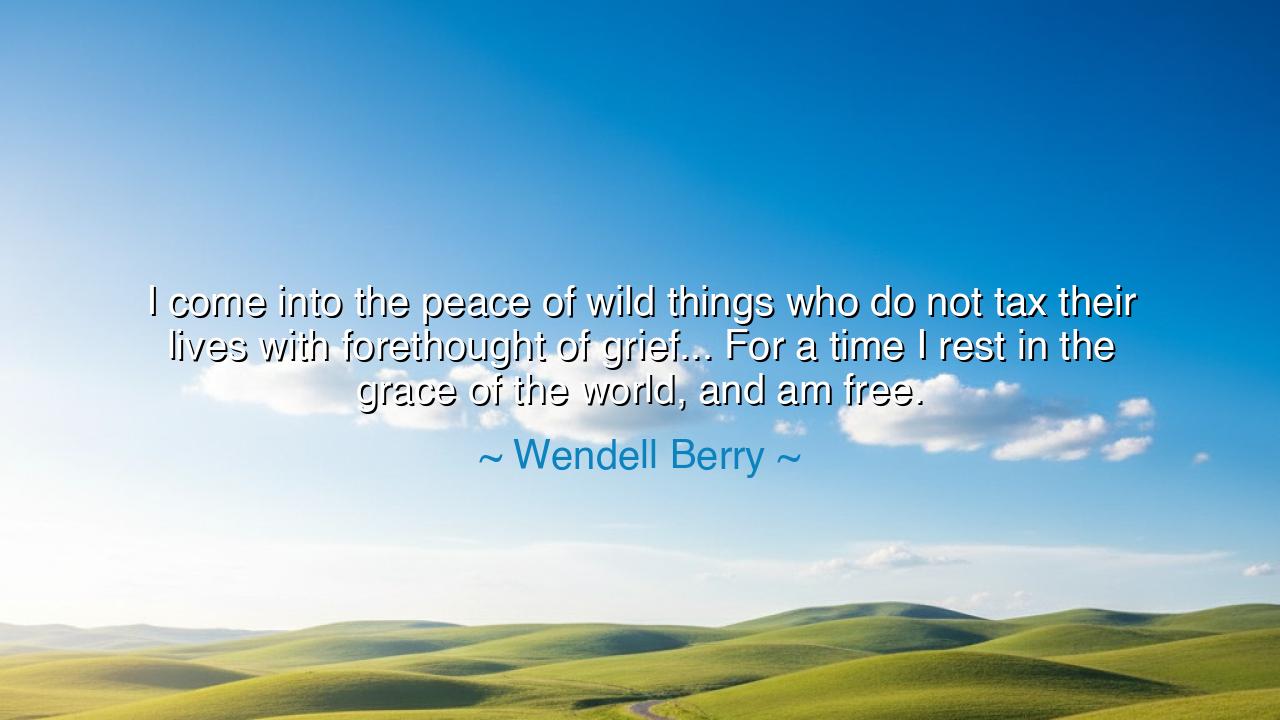
I come into the peace of wild things who do not tax their lives
I come into the peace of wild things who do not tax their lives with forethought of grief... For a time I rest in the grace of the world, and am free.






“I come into the peace of wild things who do not tax their lives with forethought of grief… For a time I rest in the grace of the world, and am free.” — Wendell Berry
Thus spoke Wendell Berry, the poet of the earth and the keeper of simple truths, whose words carry the quiet strength of rivers and the wisdom of wind through trees. In these lines from his poem “The Peace of Wild Things,” Berry gives voice to the yearning that dwells in every weary heart — the longing to escape the burdens of thought and return to the peace of wild things. He reminds us that the creatures of the earth live without the weight of forethought of grief, that they dwell wholly in the present, untouched by the restless fears that consume humankind. To walk among them, to breathe where they breathe, is to step beyond anxiety and into grace — the eternal balance and beauty of the living world.
The origin of these words lies in the turbulent age from which Berry wrote — the late 20th century, when the world raced toward modernity and man grew ever more estranged from nature. Amid the machines and noise, he turned back toward the land, seeking what the ancients once knew: that the earth itself is a teacher, and that to be human is to belong to creation, not to master it. In this poem, he speaks of retreating to the wild when despair for the world grows too heavy. He finds solace not in the noise of civilization, but in the stillness of nature, among birds, trees, and waters that move without concern for tomorrow. There, he discovers the oldest kind of freedom — the freedom of being simply alive.
The wild things of which he speaks — the heron on the water, the deer in the field, the stars above — live not in fear of the future but in harmony with the moment. They do not dream of sorrow before it arrives; they do not dwell upon loss before it has been felt. In their presence, Berry rediscovers what civilization has made us forget: that life’s truest peace lies in acceptance, in surrender to the rhythm of the world as it is. The beasts of the field, the birds of the air — they do not question their place in creation, for they are creation. To dwell among them is to remember that we, too, are part of this holy order.
There is ancient wisdom here, echoing through the ages. The Stoic philosophers taught that peace comes not from control but from understanding what is beyond control. The wild things live this truth effortlessly. Where man resists the turning of the seasons, the fox, the hawk, and the oak tree accept them. Where man dreads loss, the forest endures it. The petals that fall feed the soil that will bloom again. Thus, when Berry writes, “I rest in the grace of the world,” he invokes this eternal cycle — the grace that renews itself without human hand, that forgives even the folly of mankind. In resting within that grace, he lays down the burden of his thoughts and becomes, for a time, free.
There is a story told of Henry David Thoreau, another wanderer of woods and water, who retreated to Walden Pond seeking the essence of life. Like Berry, he found that in solitude among the wild things, the noise of human striving faded away. He wrote that he went to the woods “to live deliberately,” to learn what it meant to exist without rushing toward the end. Both men — Thoreau and Berry — discovered that the wilderness is not merely a place, but a state of being, a returning home to what is simple, pure, and enduring. And in this return lies a lesson for all ages.
The lesson is this: withdraw often from the noise of the world, and let your soul be restored by the peace of wild things. Seek not always to plan, to predict, to possess — for these are the chains that bind the spirit. Go instead where the trees breathe, where the water moves in its ancient rhythm, where the world exists without need for your control. There, learn again the art of presence — of seeing, hearing, and being without burden. For in that silence, you will find what Berry found: that the world itself is grace, and that this grace is freely given.
So remember the teaching of Wendell Berry: when the mind grows heavy with forethought of grief, step outside. Go to the woods, the fields, the rivers. Watch the creatures who live without fear of tomorrow. Let their calm become your own. Rest in the grace of the world, for it was made not only to sustain your body, but to heal your spirit. And when you rise again from that peace, you will know what it means to be truly free — not by escaping the world, but by finally belonging to it.






AAdministratorAdministrator
Welcome, honored guests. Please leave a comment, we will respond soon